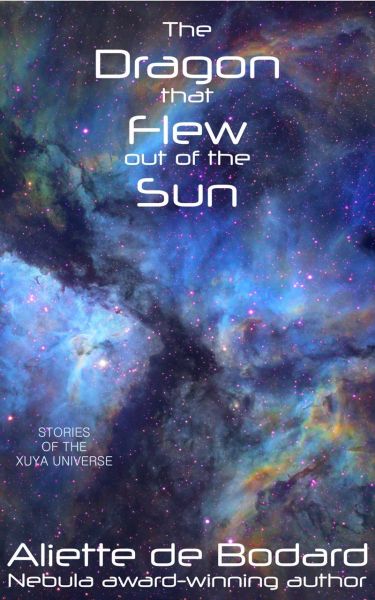When The Blind Remove Their Blinders
The Dragon that Flew out of the Sun: Stories of the Xuya Universe
By Aliette de Bodard

24 Aug, 2019
Aliette de Bodard’s 2017 The Dragon that Flew out of the Sun: Stories of the Xuya Universe collects three stories set in her alternate-future Xuya universe.
“The Dragon That Flew Out of the Sun” • short story
Lan is the child of Khiet refugees, survivors of a Ro super-weapon that sterilized the Khiet homeworld. Her classmate Vien is Ro. Co-existence is unthinkable; how can one forgive someone whose people stole one’s homeland? But there’s more to the story than Lan has been told, a reason why her parents’ generation is reticent to talk about the war.
“Ship’s Brother” • short story
Mind-ships offer unparalleled access to the universe, but their creation demands great sacrifice from human mothers. The women who offer up their health in service of interstellar travel have come to terms with their role; can their children?
“The Frost on Jade Buds” • short story
The Galactics were driven from the Scattered Pearls Belt by years of war. The Galactics left behind a wealth of war toys, mines, and other relics, any one of which could kill a local (and often do). Thuy and Chi lost their parents to a Galactic relic. Now, a Galactic trade delegation offers Chi an opportunity for revenge. The price is high.
Comments
The Xuya universe is filled with great and powerful nations with a keen eye to their own well-being, an attitude accompanied by a near-total absence of shame or guilt. Even when the consequences of evil-doing rebound on the evil-doers (such as the incineration of the Khiet planet, in retaliation for Khiet abuses) it’s clear the favoured coping mechanism is to sweep the embarrassing details under the rug.
Some readers might be reminded of the US Southern states myth of the Lost Cause; the Khiet wallow in victimhood while denying all blame. However, the bit re the super-weapon leads me to think if de Bodard had a historical model in mind, it was post-WWII Japan. No doubt there are many other possible inspirations.
“The Frost on Jade Buds” likewise seems to me likely to be based on a specific example: US-Vietnamese relations after the war. However, the author could also have been thinking of any number of post-war or post-colonial situations. Power imbalance, geopolitics, and trade considerations make seeking tangible recompense for war crimes impractical.
It’s all rather depressing, but at least the characters in these stories are not burdened by any delusion that “the arc of history is long but it bends towards justice.” They know they’re living in a world where the arc of history is long, people in power commit much the same affronts they always have, and will punish anyone foolish enough to expect an apology or recompense.
“Life is never fair. You should know that. It’s one of the first lessons Sixth Aunt taught us.”
If you’re looking for stories in which it all works out in the end, de Bodard is not the author for you. If you’re looking for well-written bleak, on the other hand…
This is where the link to purchase the book in hand should go, which gets us to a mystery. The fact I own this ebook is evidence that it exists, but the online evidence of this is meagre. It’s not listed on Amazon or Chapters-Indigo as far as I can see and my records do not mention where I acquired it (perhaps a bundle?). Never fear; have some direct links.
